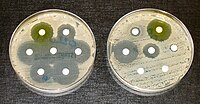
Photo from wikipedia
Severe infections caused by methicillin-resistant Staphylococcus aureus (MRSA) are often complicated by persistent bacteremia (PB) despite active antibiotic therapy. Antibiotic resistance rarely contributes to MRSA-PB, suggesting an important role for… Click to show full abstract
Severe infections caused by methicillin-resistant Staphylococcus aureus (MRSA) are often complicated by persistent bacteremia (PB) despite active antibiotic therapy. Antibiotic resistance rarely contributes to MRSA-PB, suggesting an important role for antibiotic tolerance pathways. ABSTRACT Severe infections caused by methicillin-resistant Staphylococcus aureus (MRSA) are often complicated by persistent bacteremia (PB) despite active antibiotic therapy. Antibiotic resistance rarely contributes to MRSA-PB, suggesting an important role for antibiotic tolerance pathways. To identify bacterial factors associated with PB, we sequenced the whole genomes of 206 MRSA isolates derived from 20 patients with PB and looked for genetic signatures of adaptive within-host evolution. We found that genes involved in the tricarboxylic acid cycle (citZ and odhA) and stringent response (rel) bore repeated, independent, protein-altering mutations across multiple infections, indicative of convergent evolution. Both pathways have been linked previously to antibiotic tolerance. Mutations in citZ were identified most frequently, and further study showed they caused antibiotic tolerance through the loss of citrate synthase activity. Isolates harboring mutant alleles (citZ, odhA, and rel) were sampled at a low frequency from each patient but were detected in 10 (50%) of the patients. These results suggest that subpopulations of antibiotic-tolerant mutants emerge commonly during MRSA-PB. Methicillin-resistant Staphylococcus aureus (MRSA) is a leading cause of hospital-acquired infection. In severe cases, bacteria invade the bloodstream and cause bacteremia, a condition associated with high mortality. We analyzed the genomes of serial MRSA isolates derived from patients with bacteremia that persisted through active antibiotic therapy and found a frequent evolution of pathways leading to antibiotic tolerance. Antibiotic tolerance is distinct from antibiotic resistance, and the role of tolerance in clinical failure of antibiotic therapy is defined poorly. Our results show genetic evidence that perturbation of specific metabolic pathways plays an important role in the ability of MRSA to evade antibiotics during severe infection.
Journal Title: Infection and Immunity
Year Published: 2022
Link to full text (if available)
Share on Social Media: Sign Up to like & get
recommendations!